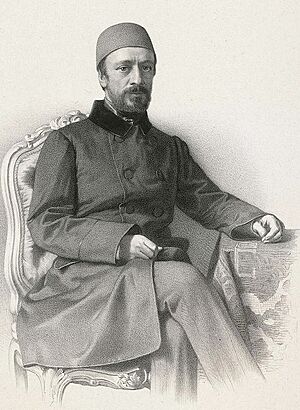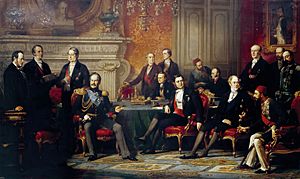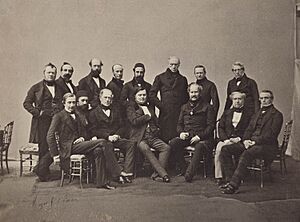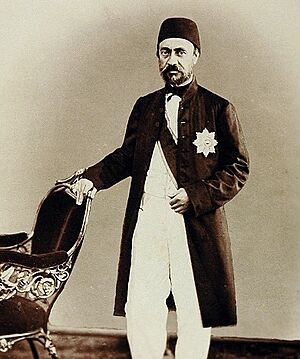Mehmed Emin Âli Pasha facts for kids
Quick facts for kids
Mehmed Emin Âli
Pasha
|
|
|---|---|
 |
|
| Grand Vizier of the Ottoman Empire | |
| In office 11 February 1867 – 7 September 1871 |
|
| Monarch | Abdulaziz |
| Preceded by | Mehmed Rushdi Pasha |
| Succeeded by | Mahmud Nedim Pasha |
| In office 6 August 1861 – 22 November 1861 |
|
| Monarch | Abdulaziz |
| Preceded by | Kıbrıslı Mehmed Emin Pasha |
| Succeeded by | Mehmed Fuad Pasha |
| In office 7 January 1858 – 18 October 1859 |
|
| Monarch | Abdulmejid I |
| Preceded by | Mustafa Reşid Pasha |
| Succeeded by | Kıbrıslı Mehmed Emin Pasha |
| In office 2 May 1855 – 1 November 1856 |
|
| Monarch | Abdulmejid I |
| Preceded by | Mustafa Reşid Pasha |
| Succeeded by | Mustafa Reşid Pasha |
| In office 6 August 1852 – 3 October 1852 |
|
| Monarch | Abdulmejid I |
| Preceded by | Mustafa Reşid Pasha |
| Succeeded by | Damat Mehmed Ali Pasha |
| Regent of the Ottoman Empire | |
| In office 21 June 1867 – 7 August 1867 |
|
| Monarch | Abdulaziz |
| Personal details | |
| Born | 5 March 1815 Istanbul, Ottoman Empire |
| Died | 7 September 1871 (aged 56) Istanbul, Ottoman Empire |
| Signature |  |
Mehmed Emin Âli Pasha (born March 5, 1815 – died September 7, 1871) was an important leader in the Ottoman Empire. He was a statesman during a time of big changes called the Tanzimat period. He is famous for creating the Ottoman Reform Edict of 1856. He also played a key role in the Treaty of Paris (1856), which ended the Crimean War. Many people believed Âli Pasha was a very skilled leader. They often said he helped stop the Ottoman Empire from breaking apart too soon.
Âli Pasha wanted to modernize the empire by adopting Western ideas. This included making the government more separate from religion. He also wanted to improve basic rights for people. He worked to calm down groups who wanted their own nations. At the same time, he fought off foreign countries trying to weaken the Ottoman Empire. He believed in an "Ottoman nationalism." This idea meant that everyone, no matter their background, should feel loyal to the Ottoman Empire.
Âli Pasha came from a simple family; his father was a doorkeeper. But he rose through the government ranks. He became the Minister of Foreign Affairs in 1840 and again in 1846. He served as Grand Vizier (like a prime minister) several times. Between 1855 and 1871, he switched between these two top jobs. He was Foreign Minister seven times and Grand Vizier five times. In 1851, he received a special award called the Order of the Red Eagle.
Contents
Early Life and Education
Mehmed Emin Âli Pasha was born on March 5, 1815, in Istanbul. His family was not wealthy; his father was a shopkeeper. He only went to primary school for three years. There, he learned to read, write, and memorize parts of the Quran. But Âli Pasha kept learning on his own. He even taught himself to speak French.
He started working for the government at age 14. His first job was as a clerk in the Imperial Council. The next year, he moved to the records department. A year later, he joined the Translation Office.
The Important Translation Office
The Translation Office (called Tercüme Odası in Turkish) was very important. It was created because of Greek independence. Before that, many Greeks worked as translators for the government. When Greece became independent, these translators left. This created a big need for new translators.
Also, the Ottoman Empire faced new challenges. Its armies lost to the Egyptians, and it signed a treaty with Russia. Diplomacy, or talking with other countries, became much more important. The Translation Office grew, and its workers earned better pay. This job helped Âli Pasha and others, like his future partner Mehmed Fuad Pasha. They gained valuable experience in diplomacy. This work helped shape their ideas for modernizing the empire.
Working with Mustafa Reşid Pasha
In 1835, Âli Pasha became a secretary at the Ottoman Embassy in Vienna. There, he learned about how the Austrian Empire was organized. A few years later, he became an advisor to Mustafa Reşid Pasha. Mustafa Reşid Pasha was the ambassador to Britain. In 1839, he became Grand Vizier. He started a period of major reforms in the Ottoman Empire. This time was known as the Tanzimat period.
Mustafa Reşid Pasha left Âli Pasha in charge when he returned to Istanbul. This helped Âli Pasha become an official ambassador. He continued to rise higher in government. When he became Grand Vizier in 1852, he was the youngest person ever to hold that position.
Role in the Crimean War
In 1854, during the Crimean War, Âli Pasha was called back to work. He became the Foreign Minister again under Reshid Pasha. In this role, he attended the Vienna conference in 1855. He became Grand Vizier again for a year in 1855. He held this important job five times in his life.
As Grand Vizier, he represented the Ottoman government at the Congress of Paris in 1856. There, he signed the peace treaty that officially ended the Crimean War.
Âli Pasha as a Diplomat

In 1846, Mehmed Emin Âli Pasha became the Minister of Foreign Affairs. This was not surprising, given his excellent diplomatic skills. Even Sultan Abdülaziz, who often disagreed with Âli Pasha, admitted that he was too important to replace.
As an ambassador, Âli Pasha worked to build friendships with England and France. He also wanted to bring Western ideas into the Ottoman Empire. For example, he used his knowledge of the French education system. He helped create the modern Galatasaray High School. This school taught students of different religions together, including Muslims. His goal was to help people of other faiths see Turks as friends, not enemies.
Âli Pasha's responsibilities grew even more. He was chosen as the main delegate for the peace talks after the Crimean War. He was also appointed Grand Vizier again in 1855. At the Congress of Vienna, he helped create a peace plan. This plan brought the Ottoman Empire into the Concert of Europe. This was a system where European nations worked together to keep peace. The other European powers agreed to respect the Ottoman Empire's land and independence. This plan was later included in the 1856 Treaty of Paris.
The Important Reform Edict of 1856
England, France, and Sardinia helped the Ottoman Empire in the Crimean War. The 1856 Treaty of Paris also saved the empire from Russia. But now, these helper countries put pressure on the Ottoman Empire. They wanted all citizens to be treated equally, no matter their religion.
In response, Grand Vizier Âli Pasha created the Hatt-i Humayun reform edict of 1856. This edict promised that everyone would be equal under the law. It opened government jobs to all citizens. It also guaranteed the safety of non-Muslims' lives and property. And it promised that no one would be forced to change their religion.
Because of this edict, more Christian missionaries came to the Ottoman Empire. Some people worried that Muslims would convert to Christianity. They also worried that converts might avoid military service. To address this fear, the Ottoman Empire later made a rule against conversion. This meant that people who converted to Christianity could be arrested and punished. The new freedoms were also not popular with some non-Muslims. For example, some Christian groups were unhappy about being treated the same as Jewish people.
Âli Pasha and His Opponents
Âli Pasha often argued with the Sultan about the Grand Vizier's powers. He insisted that the Sultan should let him choose ministers, secretaries, and even assistants. Âli Pasha also removed people who disagreed with his political views. One such group was the Young Ottomans.
The Young Ottomans strongly disagreed with the Tanzimat reforms. They thought the reforms were giving in to Europe's demands. They felt these changes went against Islamic law. Âli Pasha, however, wanted all citizens to unite. He believed in giving equal chances in education and public jobs. He thought this would make Christians feel less oppressed. This would lead to a stronger, more stable empire. This idea of uniting Ottoman citizens was called Ottomanism. The Young Ottomans did not agree with this view. They shared their ideas through newspapers. Even though their opposition was within Istanbul's censorship rules, Âli Pasha closed their newspapers and sent them away.
In 1867, Sultan Abdul Aziz went on a trip to Europe. Âli Pasha stayed in the capital and was appointed regent. He ruled the Ottoman Sultanate for 44 days during this time.
Death and Lasting Impact
Âli Pasha's close friend and fellow reformer, Mehmed Fuad Pasha, died in 1869. Fuad Pasha was the acting foreign minister when he passed away. After his friend's death, Âli Pasha took on both the foreign minister and prime minister (Grand Vizier) roles. He was sad about Fuad Pasha's death. The added stress of leading reforms alone made his health worse. He became sick with tuberculosis and died on September 7, 1871, at age 56. He had been ill for three months.
After his death, the Young Ottomans returned from exile. They hoped to find a government that shared their ideas. However, the Tanzimat period of reforms ended. The new Grand Vizier, Mahmud Nedim Pasha, believed the Sultan should have absolute power. The only thing he shared with the Young Ottomans was the belief that the Ottoman Empire should have an Islamic character.
Âli Pasha's Final Thoughts
In 1910, a document said to be Âli Pasha's political will was published. It was supposedly written in 1871, just before he died. It was addressed to Sultan Abdülaziz. In this document, he listed his achievements. These included keeping the Ottoman Empire together and improving the government. He also mentioned dealing with rebellions and starting railroad construction. He spoke of trying to please European powers.
He also mentioned some failures, like the tax system. He then gave the Sultan advice for the future. This advice included keeping religious freedom and allowing non-Muslims into the army and government. He also suggested improving the tax system. However, later research has questioned if this document was truly written by Âli Pasha. Some historians believe it was a hoax when it was first published in 1871.
See also
- List of Ottoman grand viziers
- Internationalization of the Danube River
- Mehmed Rashid Pasha
Images for kids
 | Ernest Everett Just |
 | Mary Jackson |
 | Emmett Chappelle |
 | Marie Maynard Daly |




